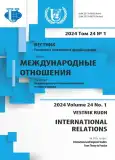Особенности политики правительства Индии в сфере экспорта вооружений в контексте реформирования военно-промышленного комплекса
- Авторы: Лихачев К.А.1
-
Учреждения:
- Санкт-Петербургский государственный университет
- Выпуск: Том 24, № 1 (2024): Международные и региональные исследования: от теории к практике
- Страницы: 92-106
- Раздел: МЕЖДУНАРОДНАЯ БЕЗОПАСНОСТЬ
- URL: https://journal-vniispk.ru/2313-0660/article/view/320718
- DOI: https://doi.org/10.22363/2313-0660-2024-24-1-92-106
- EDN: https://elibrary.ru/FCHIMW
- ID: 320718
Цитировать
Аннотация
Рассматриваются основные направления и особенности политики правительства «Бхаратия джаната парти» (БДП) по стимулированию экспорта вооружений, военной и специальной техники (ВВСТ) в контексте общей стратегии по реформированию индийского военно-промышленного комплекса (ВПК). В долгосрочной перспективе политика индийского правительства направлена на достижение «стратегической независимости» в оборонном секторе. В краткосрочной перспективе индийский экспорт вооружений выступает локомотивом программ «Сделай в Индии» и «Самодостаточная Индия», которые играют центральную роль в политической стратегии премьер-министра Нарендры Моди. Значительное увеличение экспортных планов индийского правительства частично обусловлено обострением пограничных противоречий с КНР c 2017 г. Экспорт ВВСТ становится важным инструментом по укреплению двусторонних связей Индии со странами Азиатско-Тихоокеанского региона в противовес Китаю. Тем не менее вхождение Индии в группу мировых лидеров по экспорту вооружений, как и полная «стратегическая независимость», труднодостижимы даже в долгосрочной перспективе. Несмотря на целый ряд системных реформ в ВПК, привлечение частного бизнеса и иностранного финансирования, развитию оборонной промышленности и экспорту индийских ВВСТ препятствует ряд факторов. Среди них недостаточное развитие производственного сектора, зависимость от иностранных технологий и слабое финансирование военно-технических разработок. В то же время политика поддержки оружейного экспорта и реформирования ВПК является устойчивой тенденцией в стратегии правительства БДП и в целом играет важную роль в реализации его краткосрочных, среднесрочных и долгосрочных целей.
Ключевые слова
Об авторах
Кирилл Александрович Лихачев
Санкт-Петербургский государственный университет
Автор, ответственный за переписку.
Email: likhachevkirill@gmail.com
ORCID iD: 0000-0003-3017-4194
SPIN-код: 7962-9650
кандидат исторических наук, доцент кафедры теории и истории международных отношений
Санкт-Петербург, Российская ФедерацияСписок литературы
- Behera, L. K. (2016). Indian defence industry: An agenda for making in India. New Delhi: Pentagon Press.
- Behera, L. K. (2021a). India’s defence economy. Planning, budgeting, industry and procurement. New York: Routledge.
- Behera, L. K. (2021b). Institutions that shaped India: DRDO. New Delhi: Rupa Publications.
- Chakravorty, P. K. (2022). Future technologies for the Indian army. New Delhi: KW Publishers Pvt Ltd.
- Chhibber, A. (2018). India’s Defence Procurement Procedure. Challenges and way forward with special reference to offsets. New Delhi: KW Publishers Pvt Ltd.
- Choudhary, L. R. (2022). Evaluating jointness in the Indian military: A conceptual and methodological approach. Journal of Defence Studies, 16(1), 19-45.
- Cowshish, A. (2014a). Assessing modernization of the Indian Armed Forces through budgetary allocations. Journal of Defence Studies, 8(1), 5-19.
- Cowshish, A. (2014b). Distortions in the discourse on modernization of armed forces. Journal of Defence Studies, 8(3), 7-20.
- Cowshish, A. (2016). Galvanizing ‘Make in India’ in defence: The experts’ committee chips in. Journal of Defence Studies, 10(1), 5-16.
- Desouza, K. A. (2016). Transfer of defence technology to India: Prevalence, significance and insights. Journal of Defence Studies, 10(4), 31-52.
- Desouza, K. A. (2017). Transfer of defence technology: Exploring the avenues for India. Journal of Defence Studies, 11(3), 69-98.
- Ganapathi, V. (2016). Increasing efficiency in defence acquisitions in the army. New Delhi: KW Publishers Pvt Ltd.
- Kalyani, V. (2021). Vision Sagar. Indian Air Force in the Indian ocean. New Delhi: Pentagon Press LLP.
- Kaushik, C. (2017). Public-private partnership for MRO in defence: Application to aerospace and land systems. Journal of Defence Studies, 11(3), 41-67.
- Khudoley, K. (2022). New Russia - West confrontation: War of attrition or escalation? Strategic Analysis, 46(6), 571-584. https://doi.org/10.1080/09700161.2022.2149980
- Likhachev, K. (2018). The key features of relations between Russia and India in the context of a shifting balance of power in Asia. Stosunki Międzynarodowe - International Relations, 54(2), 51-78. Retrieved from http://www.irjournal.pl/pdf-124128-52128?filename=The%20Key%20Features%20of.pdf
- Murti, M. (2020). A comparison of defence sector innovation ecosystems in China and India. Strategic Analysis, 44(1), 45-53. https://doi.org/10.1080/09700161.2020.1700001
- Pakanati, R. (2019). India’s domestic debate over china’s growing strategic presence in the Indian ocean. Journal of Defence Studies, 13(1), 5-31.
- Pant, H. V. (Ed.). (2020). The Routledge handbook of Indian defence policy. Themes, structures and doctrines. London, New York: Routledge.
- Ram, V. (2018). India’s defence diplomacy with Southeast Asia: An impetus to Act East. Journal of Defence Studies, 12(3), 55-78.
- Ranade, V. S. (2022). Bridge on the bay. Journal of Defence Studies, 16(1), 63-71.
- Sharma, R. (2021). The determinants of India’s national military strategy. New Delhi: Vij Books India Pvt Ltd.
- Singh, R. (2016). Equilibrium in higher defence organization and the need for restructuring. Journal of Defence Studies, 10(2), 19-37.
- Singh, S. K. (2020). A game theoretic analysis for Ladakh Standoff, 2020. Journal of Defence Studies, 16(1), 3-18.
- Suman, M. (2021). Of matters military: Defence production and mission ‘Make in India’. New Delhi: Vij Books India Pvt Ltd.
- Thomas, R. (2020). Leveraging India’s maritime diplomacy. Journal of Defence Studies, 14(3), 1-27.
Дополнительные файлы









